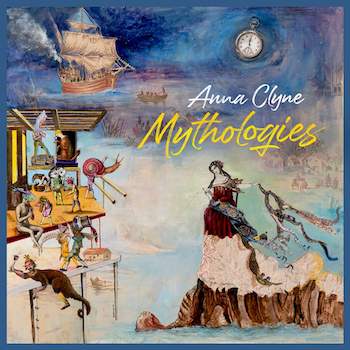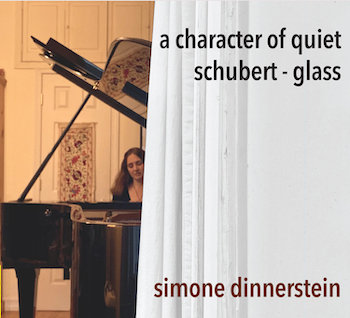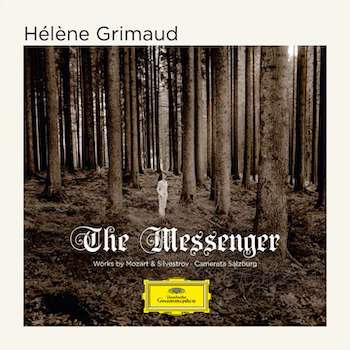Classical CD Reviews: Anna Clyne’s “Mythologies,” Simone Dinnerstein’s “A Character of Quiet,” and Hélène Grimaud’s “The Messenger”
By Jonathan Blumhofer
Composer Anna Clyne’s new disc displays her maturity as a composer and brilliance as an orchestrator; pianist Simone Dinnerstein builds a number of bridges between Philip Glass and Franz Schubert; pianist Hélène Grimaud’s interesting program is marred by some uneven Mozart.

Anna Clyne’s Mythologies marks the composer’s second big release of 2020 (her cello concerto, Dance, was the first). And, on the whole, it’s a timely celebration of one of her generation’s most agreeable composers.
The opening track, Masquerade, written for the 2013 Last Night of the Proms, comes over as a dazzling, woozy curtain-raiser. The piece does exactly what it’s supposed to, offering spades of color and brilliantly showcasing the orchestra all in the course of about four minutes. Marin Alsop and the BBC Symphony Orchestra (BBCSO) have the whole thing perfectly (and ingratiatingly) in hand.
The remainder of the disc’s programming, though, is rather darker.
This Midnight Hour juxtaposes haunting imagery from a pair of poems, one by Juan Ramón Jiménez and the other by Charles Baudelaire. Its aggressive moments and episodes work best – like the driving, opening rhythmic figure, and the surprise ending – while the quarter-tone waltz gets a bit static on its repetitions. Even so, Sakari Oramo and the BBCSO ably draw out Clyne’s alluring sense of orchestral color and strong dramatic sensibilities.
A similarly mysterious atmosphere pervades The Seamstress, a violin concerto that doubles as a ballet. Clyne’s writing alternates folklike gestures and Coplandesque textures with episodes of fiery dissonance and an eerie recitation of Yeats’s eponymous poem whispered by Irene Buckley. The writing for orchestra is, again, deft and subtle, but even more striking is the solo line – impeccably dispatched by Jennifer Koh – which uses space and register craftily and doesn’t waste a note.
Clyne’s Night Ferry, originally written for the Chicago Symphony Orchestra, gets a performance from the BBCSO (led by Andrew Litton) that’s definitive: there’s a confidence to the lyrical writing that’s absent in the CSO’s recording, as well as livelier tempos and an overall stronger sense of space and color.
The album’s earliest work, 2005’s <<rewind<< is its weakest: motoric and visceral, yes, but, ultimately one-dimensional and shallow.
Even so, Clyne’s maturity as a composer and brilliance as an orchestrator is capably demonstrated in each of the previous pieces. What’s more, her language – at once contemporary and expressive – is both satisfying and emotionally direct.
 Here’s one of the year’s striking pairings: Simone Dinnerstein’s A Character of Quiet not only builds a number of bridges between Philip Glass and Franz Schubert but compellingly draws out the novel – and traditional – aspects of each composer’s language. Taped at the pianist’s home in Brooklyn over the summer, the disc offers three of Glass’s 20 Etudes as a counterweight to Schubert’s great B-flat-major Piano Sonata (D. 960).
Here’s one of the year’s striking pairings: Simone Dinnerstein’s A Character of Quiet not only builds a number of bridges between Philip Glass and Franz Schubert but compellingly draws out the novel – and traditional – aspects of each composer’s language. Taped at the pianist’s home in Brooklyn over the summer, the disc offers three of Glass’s 20 Etudes as a counterweight to Schubert’s great B-flat-major Piano Sonata (D. 960).
There have been several recordings, thus far, of the complete Glass Etudes. But none, to my ears, have captured their essentially Romantic qualities as profoundly as Dinnerstein does here.
She opens with the undulating Etude no. 16, playing it with a potent sense of dramatic and musical shape. This is followed by a driving account of the Etude no. 6. Dinnerstein ensures that there’s a strong direction to the music’s melodic figures as well as a clear delineation between its contrasting duple and triple rhythmic patterns. The results are more Chopinesque than not.
In the dreamy reading of the Etude no. 2 that completes the set, there’s no sense of hurry, the music’s voicings are weighted with serene delicacy, and Dinnerstein teases out the score’s gentle lyricism. It’s an altogether haunting accomplishment.
The Schubert that follows is, like the last Glass compositions, broadly sung and flexible. Dinnerstein treatment of the big first movement is stately throughout, though at times her phrasing borders on the fussy. The second, though, is ravishing: there’s a powerful sense of release in the central episode and the coda is pristine.
As for the dancing third movement, Dinnerstein’s playing is, tempo-wise, a bit unsettled; the thread tying it all together means that, regardless of how the music is shaped, the performance feels reined in. Like the first movement, the finale’s a bit contrived, phrase-wise, though well-balanced throughout.
That said, the most arresting feature of this release is how Dinnerstein emphasizes the shared characteristics of both composers’ styles: the repetitions of harmonic phrases and musical textures, fragmentations of melodic lines, and surprising dissonances, among them. If the result, paradoxically, cements the Glass Etudes in a longer tradition of serious, bravura keyboard works, that’s no small feat: there’s more to his music than often meets the eye.

Hélène Grimaud is as unpredictable an artist as they come, and, on the surface at least, there’s a lot to recommend The Messenger, her new compendium of pieces by Mozart and the Ukrainian composer Valentin Silvestrov.
For the Mozart selections, she’s opted to frame the stormy Piano Concerto no. 20 in D minor with a pair of Fantasias: the D minor (K. 397) and C minor (K. 475). These are balanced out by Silvestrov’s title track, heard here in a pair of versions (one with orchestra, one for solo piano) and the short Two Dialogues with Postscript.
There are clear lines tying together The Messenger and Mozart: Silvestrov’s elegiac 1996 essay is full of Mozart quotations and allusions. The Dialogues (from 2002), with their subtle references to Wagner, provide a nice contrast.
Grimaud’s at her best in the Silvestrov scores, drawing out the soft-hued nuances of The Messenger especially well in the solo edition. The three movements of the Dialogues – “Wedding Waltz,” “Postlude,” and “Morning Serenade” – are also warmly done, Grimaud and the Camerata Salzburg achieving a lovely timbral blend throughout.
Problems creep up, though, in the Mozart works.
To be sure, the D-minor Concerto has its moments. Grimaud’s keyboard playing in it is astonishingly clear – every note speaks. The cadenzas (both written by Beethoven) roil. And, generally, there’s a strong sense of drive to the proceedings: nothing’s sleepy here.
At the same time, her tone is, on the whole, too bright and hard-edged. As the piece proceeds that gets wearing. Lively as the tempos are, the slow movement needs a bit more space to breathe and the finale’s jubilant major-key coda is simply a blur: there’s no sense of characteristic release to be found in its measures.
That’s a shame, because the Camerata’s accompaniments are, overall, quite pert and highlighted by some fantastic woodwind playing.
The Fantasias suffer from the same edgy tone Grimaud brings to the Concerto. The D-minor one is a bit too resonant, thanks to some heavy pedaling over its opening section, though there’s a good sense of direction to Grimaud’s reading and some strong dynamic contrasts to be had. Unfortunately, she cuts the closing cadence short to elide the end of the Fantasia into the beginning of the Concerto – which, on top of being jarring and sounding a bit gimmicky, doesn’t make a lot of musical sense.
Her approach is largely the same in the big C-minor Fantasia that follows the Concerto: tonally brittle and interpretively literal.
The sum total is an interesting program with uneven accounts of the Mozart works marring some fine (if slight) pieces by Silvestrov.
Jonathan Blumhofer is a composer and violist who has been active in the greater Boston area since 2004. His music has received numerous awards and been performed by various ensembles, including the American Composers Orchestra, Kiev Philharmonic, Camerata Chicago, Xanthos Ensemble, and Juventas New Music Group. Since receiving his doctorate from Boston University in 2010, Jon has taught at Clark University, Worcester Polytechnic Institute, and online for the University of Phoenix, in addition to writing music criticism for the Worcester Telegram & Gazette.
Tagged: Anna Clyne, Avie, Deutsche Grammophon, Hélène Grimaud, Orange Mountain Music

